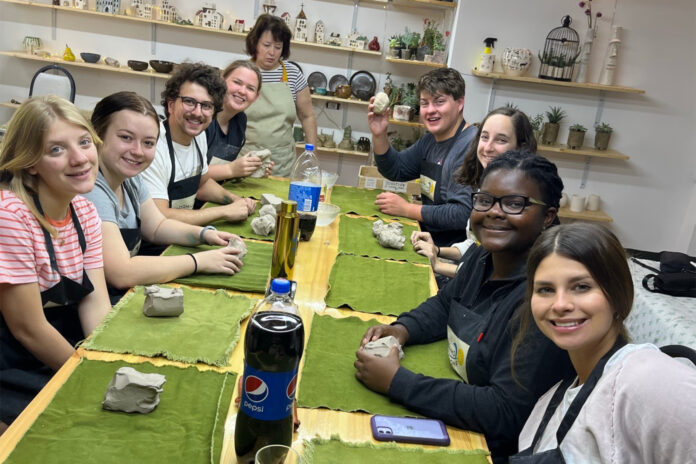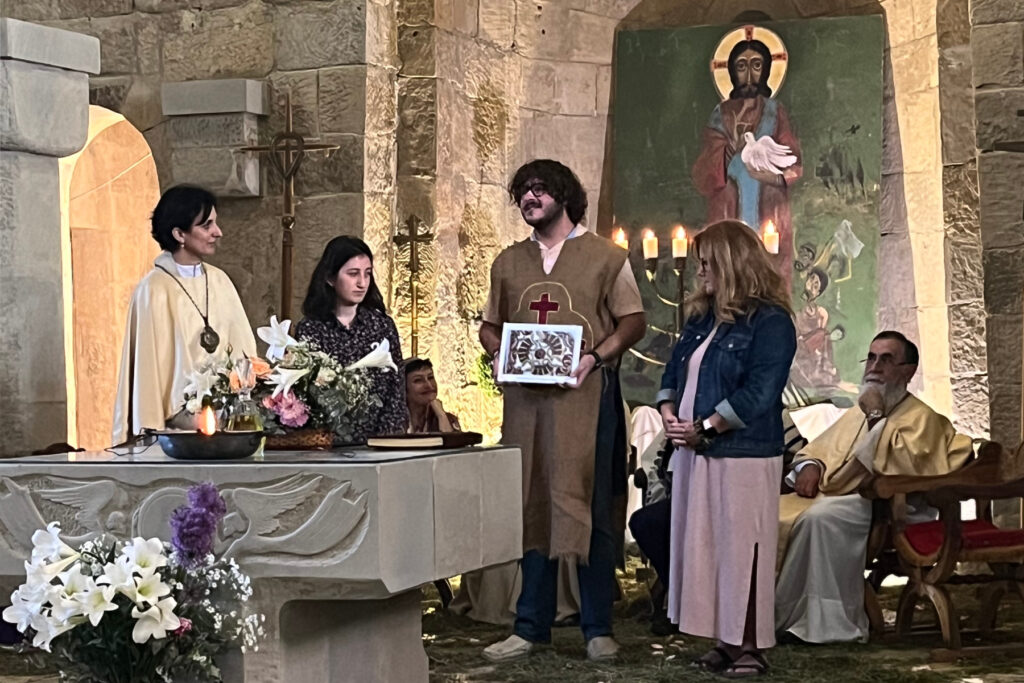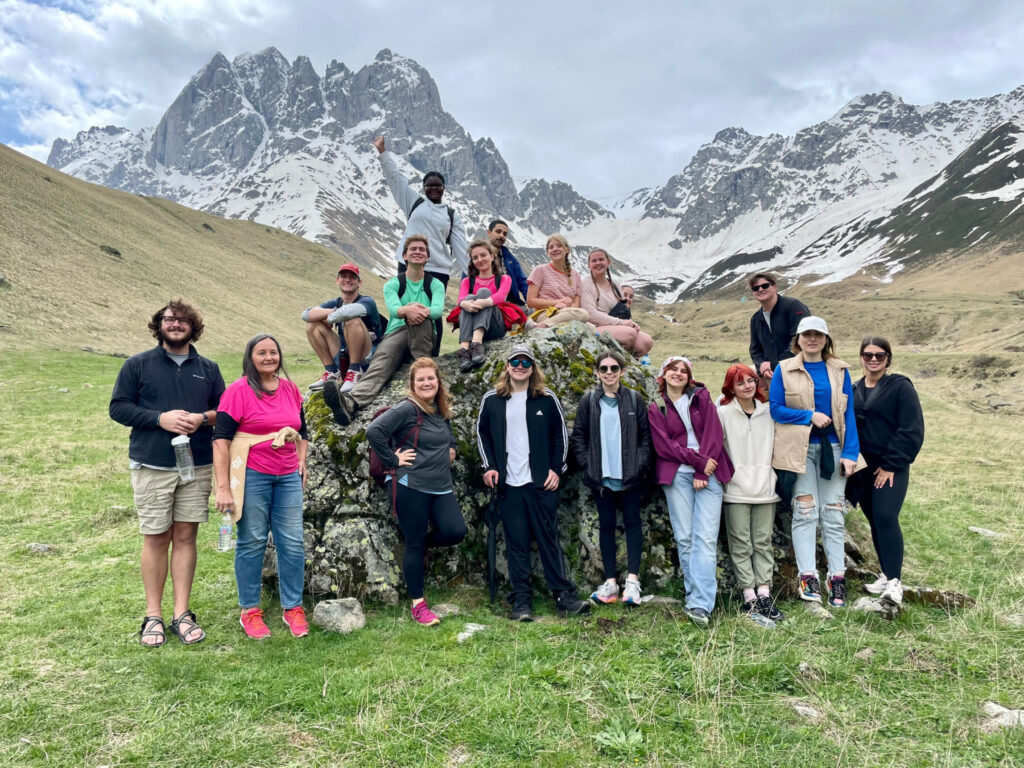
Mercer University students and faculty helped build cultural bridges during a Mercer On Mission trip to Georgia this summer.
Hosted by the Evangelical Baptist Church of Georgia and the World Association of Georgia Muslims, the Mercer team stayed in Tbilisi at the Beteli Center for refugees, learning the refugees’ stories and helping make pottery, which the refugees sold to send money back home.
In addition, the Mercer group attended Christian, Jewish and Muslim worship services at the interfaith Peace Cathedral, conversed with Muslim students, and visited the George Eliava Institute of Bacteriophages, Microbiology and Virology.
This was the seventh Mercer On Mission trip to Georgia for Dr. Chris Grant, professor of political science. He was joined this time by Dr. Linda Hensel, professor of biology, and Lauren Benedict, adjunct instructor of integrative studies in the College of Liberal Arts and Sciences.
Each visit to Georgia is different and tailored to the needs of the refugee center, Dr. Grant said. The addition of Dr. Hensel added a scientific element that allowed biology majors to have hands-on service in their field.
“What I really like about this mission trip is you don’t have that American imperialist attitude that you’re coming in to help make it better,” Dr. Hensel said. “You go in, and you sit there, and you basically say, ‘What do you need? What can we do to help you?’”
Many of the refugees at the Beteli Center were Ukrainians who fled their country after the Russian invasion. While many did not speak English, the Mercer students communicated with them by using Google Translate on their phones.
“We would learn about their stories, and a lot of them had families that were still in Ukraine actually, that are in war zones right now,” said Tysen Dougherty, a rising senior majoring in law and public policy. “We wanted to try to provide a safe environment for them where they felt that they could open up about anything they wanted to talk about. None of us who were on the trip could ever think of experiencing something like that, but it’s really tough to get uprooted from your homeland.”
Students worked alongside refugees in the pottery studio at the center, crafting pieces including ceramic fruits, animals and small shapes like hearts on which they painted the Ukrainian flag. They left pieces to sell and bought some to take home as well.
While in Tbilisi, the team visited the Peace Cathedral, which houses a cathedral, mosque and synagogue. In the wake of antisemitism and Islamophobia in Georgia, the Peace Cathedral’s founders “have been on a mission to pull people from disparate religious traditions together in a stance of solidarity,” Dr. Grant said.

In addition to attending the different worship services, students had conversations that included varying perspectives. They also engaged with two other university student groups, exchanging thoughts on religion, politics and culture.
“One of the biggest things I learned is that even in cultures that are so different, we’re all a lot more similar than you think, and it’s easy to find commonalities between pretty much anyone,” Dougherty said.
One day, the group hiked up the mountains to the primarily Muslim town of Khulo, where the Mercer group interacted with schoolchildren and helped them with their English.
“We had an afternoon at the boarding school where we got to play all kinds of games with them,” said Jalyn Massey, a rising senior double-majoring in biology and Spanish. “The girls made friendship bracelets. We played this game kind of like Twister. Most of their English was pretty good, so we got to have good conversations with them.”
The Mercer team also learned how people there take care of the dying.
“They talked to the children that they met and the adults that they met about dying, and the children, amazingly, were not horrified by death or saddened by death like we are in our country,” Dr. Hensel said.
That’s because in Georgia, people die at home while being cared for by women in the family, whereas in the U.S., many people die in hospice or another facility while being cared for by non-family members.

Back in Tbilisi, a smaller Mercer group visited Firefly World, the first children’s hospice in Georgia. The students were allowed to shadow a doctor, who wanted help with medical English from the pre-med students.
“She told us about each child’s condition, and we got to observe some bedside procedures while we were there,” said Massey, who plans to go to medical school. “It was a sad experience but something I’m glad I got to do.”
They also participated in a birthday party for a patient.
“It was a conflict of emotions for me because I see them being all happy for this kid who is turning 17 years old but at the same time knowing where he was in the hospice center and he probably would die,” said Luis Jiménez, who graduated in May with an undergraduate biology degree and plans to pursue veterinary school. “It was a very emotional experience doing the hospice care.”
The full group gathered again for a visit to the George Eliava Institute of Bacteriophages, Microbiology and Virology, where researchers study phages and their applications. A phage is a virus that kills bacteria, and Eastern medicine uses them to prevent and treat bacterial infections. While Western medicine relies on antibiotics, interest in phages is starting to grow, Dr. Hensel said.
“This trip was a wonderful way to end my time at Mercer,” Jiménez said. “I felt it taught me more about the world.”









